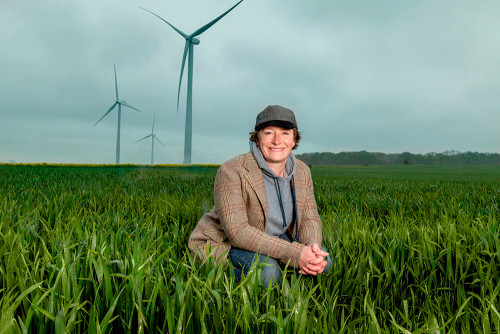
Juliet Davenport at Hampole wind farm near Doncaster. (Courtesy: kalory.co.uk)
By Margaret Harris
In the days following the Great Storm of October 1987, as people across southern England and northern France picked roof tiles and downed tree limbs out of their gardens, Juliet Davenport began thinking seriously about weather.
At the time of the storm, Davenport – now the chief executive of Good Energy, a UK-based supplier and generator of renewable energy – was a third-year physics student at the University of Oxford. She was fascinated to learn that meteorologists (including the BBC’s Michael Fish, who famously told viewers “not to worry” about an approaching hurricane) got their predictions wrong due, in part, to a simple error in the location of ship-based weather observations in the Bay of Biscay, which led them to predict that the storm would follow a more southerly track. “I realized then just how fundamentally sensitive our systems are to data fluctuations,” she told an audience at the University of the West of England (UWE) last night.
Thirty years later, Davenport is still fascinated by the science of weather and climate, but she has also become passionate about the economics of how business becomes an “engine for change” in the world. The role of business in decarbonizing the UK economy was a major theme of her talk. Often, she explained, people regard sustainability and climate change as “someone else’s problem”. That isn’t useful, she said, because “if you expect one part of a society to do all the work, it’s really hard”.
Of course, founding a renewable-energy company wasn’t exactly easy. Early in the company’s history, Davenport explained, she struggled to convince potential funders to back her. Indeed, when she approached the private equity firm 3i with a request for investment, a “spotty youth” (presumably a junior associate) turned her away, sneering “Why would I ever back anybody who’s trying to sell ‘green’?” Other challenges came from energy regulators, who asked Davenport for three years’ worth of audited accounts before they would grant Good Energy a licence to operate – a prudent requirement given the sensitive nature of the energy market, perhaps, but also one that was nigh-on impossible for a brand-new start-up to meet.
In absolute terms, Good Energy is still a minnow in the UK energy market, supplying renewable electricity to around 75,000 customers (disclosure: I’m one of them) and administering feed-in tariffs for 133,000 small-scale electricity generators. But it has grown steadily, and Davenport sounded optimistic about the future. The importance of dealing with climate change is now clear, at least from a scientific perspective, and green technology is making rapid progress on many fronts. Indeed, Davenport argued that some technologies have already reached a tipping point in public acceptance. “Once you’ve driven an electric vehicle, you don’t want to go back,” she explained, adding that she drives her own electric/petrol hybrid without heat, even in the winter, to extend the battery’s range because she finds the petrol motor so disappointing in comparison.
Progress on the policy front has been slower, though, and Davenport expressed some disappointment with the current UK government. “The way they’re acting, you’d think we never signed the Paris agreement on climate change,” she said, noting that the Brexit vote seems to have ushered in “a period of extreme short-termism” in Whitehall, with green targets scrapped and research on some technologies (such as carbon capture and storage and tidal lagoons) abandoned or put under review.
Mostly, though, Davenport stayed upbeat. At one point, she even stated that the UK has “plenty” of renewable energy. This surprised me, as I dimly remembered reading (in the late David J C Mackay’s book Sustainable Energy Without the Hot Air) that we’d need to cover most of Wales with wind turbines in order to meet 100% of the UK’s energy needs with renewables. After the talk, I asked Davenport whether Mackay had got his numbers wrong, or if something had changed since Sustainable Energy was published in 2008. Her answer was that the UK’s demand for energy has been dropping by around 3% each year for several years, partly because of increased efficiency, although she admitted that climate change has also helped, since it means we no longer use as much heating as we once did. (Davenport didn’t say this, but it struck me afterward that the 2008 financial crisis and the long-term decline of British heavy manufacturing might have contributed, too. Silver linings!) At any rate, Davenport argued that the decline in energy usage, coupled with advances in (especially) off-shore wind energy, has been a game-changer for renewables, surprising even optimists.
Davenport also dealt – rather neatly I thought – with the old question of how you run a country on renewables when the Sun isn’t shining and the wind isn’t blowing. Her answer, essentially, is an arbitrage system that enables suppliers to purchase energy from regions with a temporary excess (because of favourable local weather) and sell it to regions with a temporary shortage. Politically, that might be difficult, but in physics terms, it’s hard to see much wrong with the idea, especially if the country also maintained some limited degree of nuclear or gas power as back-up.
All in all, it was an impressive talk, and at the end, one audience member even asked Davenport if she fancied going into politics. “Not at all!” she laughed. Then she added a caveat: “Well, maybe when I’m really old and I don’t care anymore.”
Guidelines
Show/hide formatting guidelines
this text was deletedwhere people live in harmony with nature and animals</q>
Some text